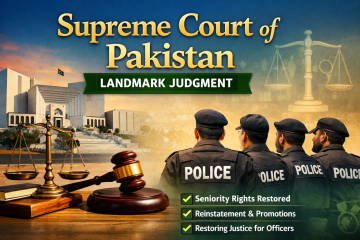Introduction:
In a recent landmark ruling, the Supreme Court delivered its verdict on the applicability of limitation periods even in cases involving void orders. The Court held that the limitation period would run against a void order, and it emphasized the importance of an aggrieved party approaching the competent forum for redressal of their grievance within the stipulated period of limitation as provided by the law.
Background:
The concept of limitation in legal proceedings serves to ensure that disputes are resolved in a timely manner, preventing the indefinite postponement of justice. It establishes a specific period within which a party must initiate legal proceedings to claim their rights or seek remedies.
Supreme Court Ruling (2023 SCMR 866):
The case before the Supreme Court involved an aggrieved party who challenged the validity of an order, claiming it to be void ab initio. The petitioner argued that as the order was void, it should not be subject to any limitation period, and they should be allowed to approach the court at any time.
However, the Supreme Court rejected this argument and ruled that the concept of limitation cannot be disregarded merely because an order is declared void. The Court emphasized that the doctrine of limitation is of paramount importance in legal proceedings to ensure that disputes are addressed within a reasonable time frame.
Reasoning behind the Ruling:
The Supreme Court provided a clear rationale for its ruling. It explained that the doctrine of limitation is essential for several reasons:
1. Certainty and Finality: Limitation brings certainty and finality to legal proceedings, ensuring that the parties involved can rely on the stability of their legal rights and obligations after the prescribed period has lapsed.
2. Preventing Stale Claims: Limitation laws prevent stale claims from being brought forward after a significant period has passed, preserving the integrity of evidence and ensuring a fair trial.
3. Judicial Efficiency: Timely resolution of disputes promotes judicial efficiency, as it allows the courts to focus on current cases and deliver justice promptly.
4. Public Interest: The limitation laws also serve the public interest by encouraging parties to pursue their claims diligently, thereby minimizing undue burden on the judicial system.
Conclusion:
In conclusion, the recent ruling of the Supreme Court in the case of ((2023 – SCMR – 866)) establishes a significant legal precedent. The Court’s decision reaffirms the importance of adhering to limitation periods, even in cases involving void orders. It underscores the principle that an aggrieved party must approach the competent forum for redressal of their grievance within the period of limitation provided by law, irrespective of the validity of the order in question. This ruling serves as a reminder to legal practitioners and litigants alike to be vigilant about complying with limitation laws while seeking justice through the judicial system.
Categories: lawyers of Pakistan in UrduLegal News



0 Comments